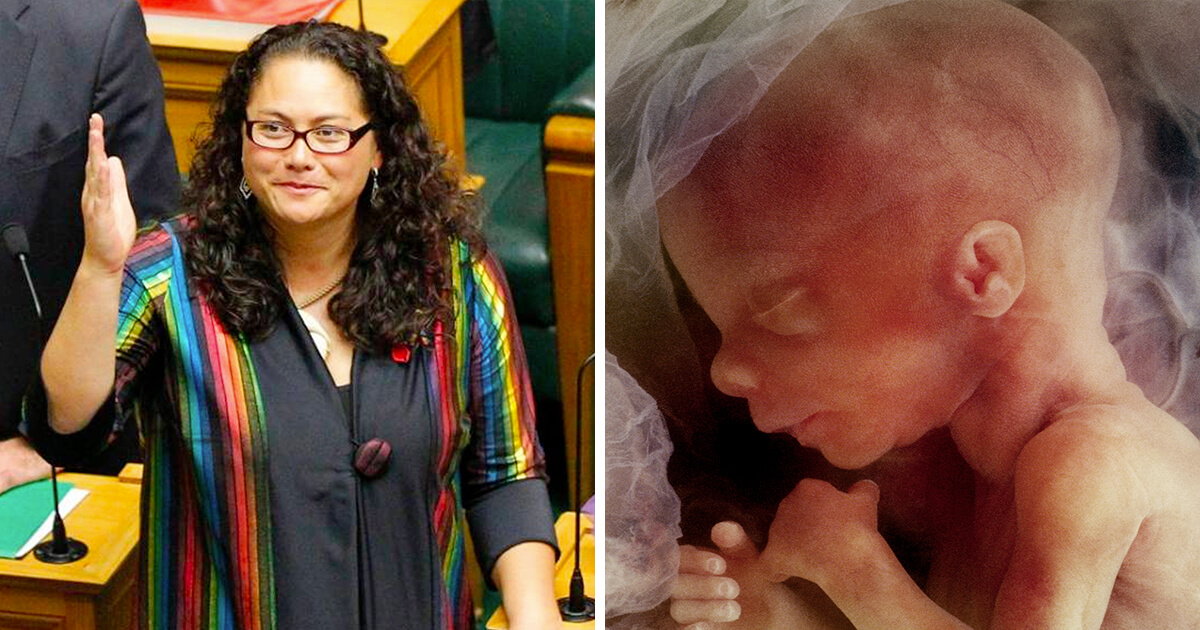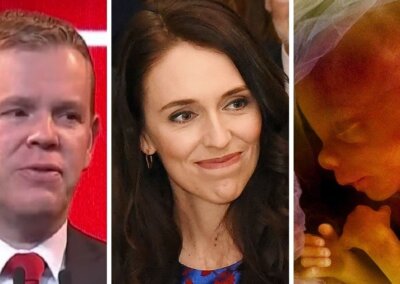Four-months after introducing the world’s most extreme abortion law, a New Zealand Labour MP has introduced a Bill to make it even worse.
Labour MP Louisa Wall‘s Contraception, Sterilisation, and Abortion (Safe Areas) Amendment Bill would deny women practical and emotional support outside abortion clinics.
The proposal states this will be done through the creation of so-called “safe areas” up to 150 metres from any part of an abortion facility, with a fine of up to $1,000 for anyone deemed to be breaking the rules.
‘Criminalised free speech zones’ would effectively ban volunteers from offering support to women entering abortion clinics and hospitals across New Zealand. They would also ban individuals from peacefully praying in the vicinity of clinics.
Similar proposals in the UK were rejected by the British Government following an extensive review and have seen widespread opposition beyond pro-life advocates to a large part of society, which may not agree on the pro-life position on abortion, but oppose censorship zones because they infringe on free speech.
A number of prominent human rights groups and campaigners, all of whom support abortion, have also spoken out against the introduction of censorship zones.
This includes Peter Tatchell, the Manifesto Club, Big Brother Watch, Index on Censorship and the Freedom Association.
Another attempt to deny women support
Pro-abortion MPs in New Zealand had sought to introduce criminalised free speech zones when they initially voted in an extreme abortion regime in the country earlier this year.
However, they accidentally allowed an amendment preventing the establishment of “buffer zones” to pass unchallenged and without a vote.
The Green Party failed in its attempt to reverse a mistake that resulted in criminalised free speech zones, which prevent pro-life help from being offered outside abortion clinics, being excluded from the legislation.
Green Party co-leader Marama Davidson had attempted to reverse their mistake and reintroduce the measure, but MPs voted 77 to 43 against it.
The new bill will be introduced to Parliament where it will face a First Reading before needing to pass a number of other stages before it becomes law.
Pro-abortion MPs will be hoping this process can be completed before the election on 19 September 2020.
Extreme abortion regime
On 18 March, New Zealand MPs voted to introduce the world’s most severe abortion law in the world by 68 votes to 51 – a much narrower margin than at the first and second reading.
The new law scraps the previous 20-week limit and will allow terminations de facto on-demand, for any reason, up to birth.
Additionally, there is now no requirement doctors must be involved with an abortion ‘procedure’ and MPs – including Prime Minister Jacinda Ardern – voted against an amendment requiring medical care for babies born alive after a ‘failed’ termination.
The new law has also legalised sex-selective abortion.
New Zealanders ignored
In light of extremely low public support and falling support from MPs, Jacinda Ardern’s Government rushed the final stages of the Bill’s progress through Parliament while politicians, the media and the rest of the country were distracted dealing with the coronavirus pandemic.
This included progressing the final sitting of the committee stage and the Bill’s third and final reading through parliament on the same day.
Polling, conducted by Curia Research revealed strong opposition to the new law by the public in New Zealand, and in particular by women.
Only 2% of women said they support abortion being available on-demand right up to birth. Meanwhile, 93% of women opposed sex-selective abortion being legal and 94% of women supported the previous legal standards for abortion providers and premises.
However, despite the extremities of the new law and little public support for the regulations, MPs voted to deny the public a final say on the legislation.
Additionally, over 40,000 New Zealanders have signed a petition urging the Government to hold a referendum giving the people of New Zealand an opportunity to repeal the extreme abortion legislation which passed earlier this year.
To put this in perspective, if New Zealand had the same population as the UK, and the same proportion of the population signed the petition this would equate to well over 500,000 signatures.
The petition’s author, Pamela McIlwraith, has said: “In my view the abortion legislation was rushed through Parliament while the entire country was distracted with COVID-19.
“I think there needs to be a referendum so the people can have their say—MPs should not be able to vote against giving the people their say in such important matters, especially a law legalising full term abortion.”
Most extreme abortion law in the world
Canada is the only country in the world that has no abortion law, as their law was struck down by a case brought to their Supreme Court in 1988.
Amongst the rest of the jurisdictions in the world that have abortion legislation, Victoria, Australia, previously had the most extreme law.
The law in Victoria allows for abortion right through to birth on physical, psychological and social grounds when approved by two doctors; this can be the abortion operating surgeon and anaesthetist.
This has, in practice, allowed for abortion on demand, for any reason, right through to birth in Victoria, Australia.
Ahead of the legislation being introduced in Victoria in 2008, abortion activists claimed that, although abortion would, in practice, be allowed for any reason, doctors would ensure that the vast majority of abortions would only occur in rare circumstances, such as when a baby had a condition where they would either die in the womb or shortly after birth (a fatal foetal abnormality or life-limiting disability) – similar claims were made about theNZ abortion legilsation by abortion campaigners and MPs in New Zealand before it became law.
Data from the 12 years of the law being in operation in Victoria shows that this has not been the case. Right To Life UK’s Public Affairs team have undertaken an extensive analysis of published abortion data on late-term abortions in Victoria from The Consultative Council on Obstetric and Paediatric Mortality.
This data shows that since the law changed in 2008, 1,418 late-term abortions (between 20-weeks’ gestation and birth) have been performed, allowed by doctors for ‘psychosocial’ reasons – these were terminations where the baby did not have a disability and the abortion was performed on social grounds. In 2011, one of these abortions on social grounds occurred at 37 weeks.
Under the previous New Zealand law, abortion was allowed post-20 weeks on very strict grounds (when the abortion is “necessary to save the life of the woman or girl or to prevent serious permanent injury to her physical or mental health”).
This strict law has meant that abortions post 20-weeks have been rare – for example 72 abortions occurred after 20-weeks in New Zealand in 2017.
Victoria has a population that is only 32% larger than New Zealand’s, but the number of abortions that occurred post 20-weeks were much higher, 324 or 348.61% higher than the number that occurred in New Zealand that same year (published data for Victoria has not been released for 2018 yet).
Another side effect of the very high late-term abortion rate in Australia is that scores of babies have been left to die after being born alive during a number of ‘botched’ terminations.
The Victorian Consultative Council on Obstetric and Paediatric Mortality and Morbidity reported that in 2012 there were 53 ‘terminations of pregnancy’ after 20 weeks ‘resulting in live birth’.
By contrast, a 2008 report for England and Wales found that 66 infants were born alive after NHS terminations in one year. While these figures are comparable in number, Victoria’s population of 6.36 million is just a tenth of the size of the population in England and Wales.
A Channel 7 news broadcast, on April 17 2010, reported that there had been a large increase in late-term abortions being performed at the Royal Women’s Hospital since the introduction of the 2008 Abortion Law Reform. Presenter Jennifer Keyte stated how “midwives and doctors feel traumatised” by having to perform so many late-term abortions at the Royal Women’s Hospital. Journalist Louise Milligan said that there had been some ‘alarming requests’ for late-term abortions, including a request for a termination at 32 weeks because the baby had a cleft lip.
The new abortion law in New Zealand is even more extreme than the law in Victoria, Australia – making it the most extreme abortion law in the world.
It allows abortions between 20-weeks’ gestation and birth with the go-ahead from just two health practitioners (this could include nurses and midwives) rather than the higher threshold of two doctors that are required in Victoria.While the legislation in New Zealand was progressing through parliament, the Abortion Legislation Committee widened the, already loose, criteria to include “overall well-being” – making it even easier for abortions to happen between 20 weeks and birth in New Zealand. These are undefined terms and it will be up to the healthcare practitioner involved as to how they interpret them.





